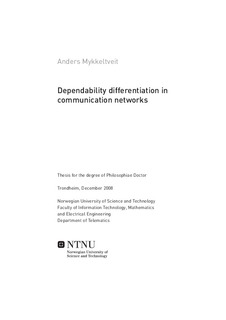| dc.contributor.advisor | Helvik, Bjarne E. | nb_NO |
| dc.contributor.author | Mykkeltveit, Anders | nb_NO |
| dc.date.accessioned | 2014-12-19T14:11:34Z | |
| dc.date.available | 2014-12-19T14:11:34Z | |
| dc.date.created | 2008-12-15 | nb_NO |
| dc.date.issued | 2008 | nb_NO |
| dc.identifier | 128237 | nb_NO |
| dc.identifier.isbn | 978-82-471-1330-1 | nb_NO |
| dc.identifier.isbn | 978-82-471-1331-8 | nb_NO |
| dc.identifier.uri | http://hdl.handle.net/11250/261491 | |
| dc.description.abstract | Unintentional failures affect links and nodes in communication networks. Recovery mechanisms are the key tool for achieving the dependability required by the services using the network. However, high dependability in communication networks comes at a high cost in terms of the capacity needed by these mechanisms.The traffic from all services and users is carried by the same backbone network. Since the users and services have different requirements, and users have different willingness to pay for a high quality of service, it is desirable to have methods that enable provision of different levels of dependability in the same network, i.e. dependability differentiation. The thesis addresses dependability differentiation in connection-oriented backbone communication networks. Two methods to provide connections meeting differentiated guarantees on the asymptotic availability are proposed.The first of these uses a novel flexible arrangement for dedicated protection denoted a protection pattern. The protection pattern is used in a proposed distributed connection management system. The system is compared with alternative proposals based on centralized management and shows good performance. The second proposal uses shared protection, which may potentially use less resources in terms of bandwidth, but has higher complexity than dedicated protection. The proposed system is based on rules to control the sharing to enable provision of guarantees. Simulation results show that the proposed method performs significantly better than an alternative strategy based on dedicated protection.A different approach to availability-guaranteed services is to offer guarantees on the interval availability which is a measure commonly used Service Level Agreements (SLAs). The thesis contains a proposal of using adaptive management to increase compliance with interval availability guarantees. Different adaptive management policies are proposed and compared to alternative static provisioning policies in a case study. The thesis also addresses the problem of measuring dependability by simulation. To reduce the simulation effort needed to obtain precise estimates of dependability attributes, a rare-event simulation technique has been applied to the well-known Network Simulator 2 (NS2). The results show that the technique is applicable to this types of simulation scenario, but the gain is modest. The thesis also contains a broad literature survey of dependability differentiation research. This is the first survey of the topic. Hence, it is in itself a significant contribution. A classification scheme for how to approach differentiation is proposed and a critical evaluation of the state of art is given.This thesis contributes to fill in some of the ``gaps'' identified, but there are still significant challenges ahead before differentiation may be deployed in operational networks. | nb_NO |
| dc.language | eng | nb_NO |
| dc.publisher | NTNU | nb_NO |
| dc.relation.ispartofseries | Doctoral Theses at NTNU, 1503-8181; 2008:312 | nb_NO |
| dc.title | Dependability differentiation in communication networks | nb_NO |
| dc.type | Doctoral thesis | nb_NO |
| dc.source.pagenumber | 211+xii | nb_NO |
| dc.contributor.department | Norges teknisk-naturvitenskapelige universitet, Fakultet for informasjonsteknologi, matematikk og elektroteknikk, Institutt for telematikk | nb_NO |
| dc.description.degree | PhD i informasjons- og kommunikasjonsteknologi | nb_NO |
| dc.description.degree | PhD in Information and Communications Technology | en_GB |

